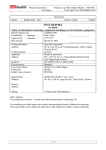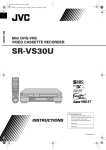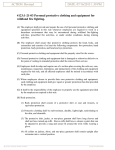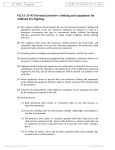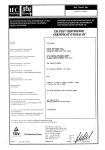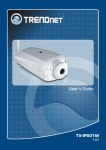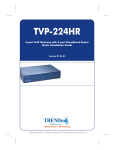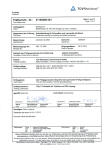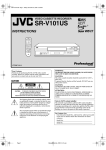Download TEST REPORT
Transcript
Test Report Test Report No.:CERASH03061001 EN 60950 Clause Requirement - Test Result -remark Verdict TEST REPORT EN 60950 Safety of information technology equipment including electrical business equipment Report reference No.: Compiled by ﹙+ signature﹚: Approved by ﹙+ signature﹚: Date of issue: ASH03061001 Fenix Yang Leon Tien July 07, 2003 Testing laboratory: Address: QuieTek Corporation . 3135 Kashiwa Street Torrance, CA 90505, USA as above TRENDware International Inc. 18F-1, No. 79, Sec. 1, Hsin Taiwu Road, Hsichih, Taipei, Taiwan. IEC 60950:1999, EN 60950:2000 Standard 1-Port USB Print Server TRENDware, TRENDnet TEW-PS1U Testing location: Applicant: Address: Standard: Test procedure: Type of test object: Trademark: Model / type reference: Manufacturer: Address: ___________________ __ ____ Same as applicant Factory: Address: Rating: +5Vdc Other Aspects: The completed test report – includes the following documents: (total page 38) Test results given in this report only relate to the specimen(s) tested, calibrated or measured. This report shall not be reproduced other than in full without the written consent of Quietek. 1 - 45 Test Report Test Report No.:CERASH03061001 EN 60 950 Clause Requirement - Test Test item particulars: Equipment mobility……………….…….…...: Operating condition ……………….….……..: Tested for IT power systems……….….……..: IT testing, phase-phase voltage(v)….………..: Class of equipment…………………….…….: Result -remark Verdict Transportable. continuous No mains connection N.A. Class III Mass of equipment (kg)……………….….….: Approx. 45g Protection against ingress of water……..……: IPX0 Possible test case verdicts: - test case does not apply to the object……….: N(.A.) - test object does meet the requirement………: P(ass) - test object does not meet the requirement.….: F(ail ) General remarks: “(see remark # )” refers to a remark appended to the report. “(see appended table)” refers to a table appended to the report. Throughout this report a point is used as the decimal separator. The test results presented in this report relate only to the object tested This report shall not be reproduced except in full without the written approval of the testing laboratory. Comments: Brief description of the test sample: The equipment’s power source from AC adaptor (L.P.S.) Top enclosure - overall 90 by 80 by 40 mm, secured together by tube.. The devices are for continuous operation. The ambient temperature for 40℃. 2 - 45 Test Report Test Report No.:CERASH03061001 EN 60 950 Clause Requirement - Test Test item particulars: Equipment mobility……………….…….…...: Operating condition ……………….….……..: Tested for IT power systems……….….……..: IT testing, phase-phase voltage(v)….………..: Class of equipment…………………….…….: Result -remark Verdict Transportable. continuous No mains connection N.A. Class III Mass of equipment (kg)……………….….….: Approx. 45g Protection against ingress of water……..……: IPX0 Possible test case verdicts: - test case does not apply to the object……….: N(.A.) - test object does meet the requirement………: P(ass) - test object does not meet the requirement.….: F(ail ) General remarks: “(see remark # )” refers to a remark appended to the report. “(see appended table)” refers to a table appended to the report. Throughout this report a point is used as the decimal separator. The test results presented in this report relate only to the object tested This report shall not be reproduced except in full without the written approval of the testing laboratory. Comments: Brief description of the test sample: The equipment’s power source from AC adaptor (L.P.S.) Top enclosure - overall 90 by 80 by 40 mm, secured together by tube.. The devices are for continuous operation. The ambient temperature for 40℃. 3 - 45 Test Report Test Report No.:CERASH03061001 EN 60 950 Clause Requirement - Test Result -remark Verdict TRENDnet _________________________________________________________________ Wireless 1-Port Print Server (USB) Model: TEW-PS1U Rating: 5Vdc 1 GENERAL P 1.5 Components P 1.5.1 Comply with IEC 60950 or relevant component standard Components, which were found to affect safety aspects, comply with the requirements of this standard or within the safety aspects of the relevant IEC component standards (see appended table 1.5.1). P 1.5.2 Evaluation and testing of components Components, which are certified to IEC and/or national standards, are used correctly within their ratings. Components not covered by IEC standards are tested under the conditions present in the equipment. P Dimensions (mm) of mains plug for direct Not direct plug-in type. plug-in : 4 - 45 N Test Report Test Report No.:CERASH03061001 EN 60 950 Clause Requirement - Test Result -remark Verdict 4 Torque and pull test of mains plug for direct dto. plug-in; torque (Nm); pull (N) ...................... : N 1.5.3 Thermal controls No thermal control. N 1.5.4 Transformers No transformer. N 1.5.5 Interconnecting cables Interconnection cable for signal connected to PC is carrying only SELV on an energy level below 240VA. P → Except for the insulation material there are no further requirements to the interconnection cable. 1.5.6 Capacitors in primary circuits ..................... : Class III equipment. N 1.5.7 Double or reinforced insulation bridged by components N 1.5.7.1 Bridging capacitors N 1.5.7.2 Bridging resistors N 1.5.7.3 Accessible parts N 1.5.8 Components in equipment for IT power systems 1.6 Power interface P 1.6.1 AC power distribution systems......................: Class III equipment. N 1.6.2 Input current Class III equipment. Normal load according to 1.2.2.1 for this equipment is movement of mouse. N P (see appended table 1.6.2) 1.6.3 Voltage limit of hand-held equipment Class III equipment. N 1.6.4 Neutral conductor Class III equipment. N 1.7 Marking and instructions 1.7.1 Power rating P See below. Rated voltage(s) or voltage range(s) (V) ..... : DC 5V 5 - 45 P P Test Report Test Report No.:CERASH03061001 EN 60 950 Clause Requirement - Test Result -remark Verdict Symbol for nature of supply for d.c. ............ : P Rated frequency or frequency range (Hz) .... : No direct connection to the AC mains supply. N Rated current (mA or A) .............................. : Not shown P Manufacturer’s name/Trademark ................. : TRENDware P Type/model .................................................. : 1) TEW-PS1U P Symbol of Class II ........................................ : Class III equipment. N Other symbols ............................................. : Additional symbols or markings do not give rise to misunderstanding. P Certification marks ....................................... : N 1.7.2 Safety instructions N 1.7.3 Short duty cycles 1.7.4 Supply voltage adjustment .......................... : No voltage/frequency setting. N 1.7.5 Power outlets on the equipment .................. : No outlet. N Equipment is designed for continuous operation. 6 - 45 N Test Report Test Report No.:CERASH03061001 EN 60 950 Clause Requirement - Test Result -remark Verdict 1.7.6 Fuse identification ....................................... : No fuse. N 1.7.7 Wiring terminals See below. N 1.7.7.1 Protective earthing and bonding terminals Class III equipment. N 1.7.7.2 Terminal for a.c. mains supply conductors Class III equipment. N 1.7.8 Controls and indicators No safety relevant switch or control. 1.7.8.1 Identification, location and marking ............ : N 1.7.8.2 Colours ....................................................... : N 1.7.8.3 Symbols according to IEC 60417 ................. : N 1.7.8.4 Markings using figures ............................... : No indicators. N 1.7.9 Isolation of multiple power sources ............. : Class III equipment. N 1.7.10 IT power system Class III equipment. N 1.7.11 Thermostats and other regulating devices No thermostat or other regulating device. N 1.7.12 Language ..................................................... : Marking and user’s manual in English. Version of other language will be provided when national approval. P 1.7.13 Durability P The label was subjected to the permanence of marking test. The label was rubbed with cloth soaked with water for 15s and then again for 15s with the cloth soaked with petroleum spirit. After this test there was no damage to the label. The marking on the label did not fade. There was no curling nor lifting of the label edge. 1.7.14 Removable parts 1.7.15 Replaceable batteries No required markings placed on removable parts. N N 7 - 45 Test Report Test Report No.:CERASH03061001 EN 60 950 Clause Requirement - Test Result -remark Verdict Language....................................................... : 1.7.16 Operator access with a tool ........................... : Only SELV inside. N 1.7.17 Equipment for restricted access locations..... : No restricted access location. N 2 PROTECTION FROM HAZARDS P 2.1 Protection from electric shock and energy hazards P 2.1.1 Protection in operator access areas P 2.1.1.1 Access to energised parts Test by inspection ........................................: N Test with test finger .....................................: N Test with test pin ..........................................: N Test with test probe ......................................: N 2.1.1.2 Battery compartments ....................................: N 2.1.1.3 Access to ELV wiring N Working voltage (V); distance (mm) trough insulation 2.1.1.4 Access to hazardous voltage circuit wiring N 2.1.1.5 Energy hazards .............................................: No energy hazard in operator access area. The connectors on the backside of the equipment below 240VA. P 2.1.1.6 Manual controls N 2.1.1.7 Discharge of capacitor s in the primary circuit N Time-constant (s); measured voltage (V) ......: See below. No manual controls 2.1.2 Protection in service access areas No maintenance work in operation mode necessary. N 2.1.3 Protection in restricted access locations It is not intended to be used in restricted locations N 8 - 45 Test Report Test Report No.:CERASH03061001 EN 60 950 Clause Requirement - Test Result -remark Verdict 2.2 SELV circuits 2.2.1 General requirements The secondary circuits were tested as SELV. See 2.2.1 to 2.2.4. P 2.2.2 Voltages under normal conditions (V)...........: 42.4V peak or 60Vd.c. are not exceeded in SELV circuit under normal operation, see appended table 2.2.2. P 2.2.3 Voltages under fault conditions (V)...............: Single fault did not cause excessive voltage in accessible SELV circuits. Limits of 71V peak and 120Vd.c. did not exceeded within 0.2s and limits 42.4V peak and 60Vd.c. did not exceeded for longer than 0.2 s, see appended tables 2.2.2 and 5.3. P 2.2.3.1 Separation by double or reinforced insulation Class III equipment. (method 1) N 2.2.3.2 Separation by earthed screen (method 2) dto N 2.2.3.3 Protection by earthing of the SELV circuit (method 3) dto N 2.2.4 Connection of SELV circuits to other circuits Only SELV circuit ........................................................................: provided. N 2.3 TNV circuits N P No TNV circuit. 2.3.1 2.3.2 2.3.3 Limits N Type of TNV circuits .....................................: Separation from other circuits and from accessible parts N Used insulation...............................................: Separation from hazardous voltages N Used insulation...............................................: 9 - 45 Test Report Test Report No.:CERASH03061001 EN 60 950 Clause 2.3.4 Requirement - Test Result -remark Verdict Connection of TNV circuits to other circuits N Used insulation...............................................: 2.3.5 Test for operating voltages generated externally N 2.4 Limited current circuits N 2.4.1 General requirements N 2.4.2 Limit values N Frequency (Hz) ............................................. : Measured current (mA)................................. : Measured voltage (V) ................................... : Measured capacitance (µF) ........................... : 2.4.3 Connection of limited current circuits to other circuits N 2.5 Limited power sources N Inherently limited output N Impedance limited output N Overcurrent protective device limited output N Regulating network limited output under normal operating and single fault condition N Regulating network limited output under normal operating conditions and overcurrent protective device limited output under single fault condition N Output voltage (V), output current (A), apparent power (VA) .....................................: Current rating of overcurrent protective device (A) Provisions for earthing and bonding N 2.6 Class III equipment. 10 - 45 Test Report Test Report No.:CERASH03061001 EN 60 950 Clause Requirement - Test Result -remark Verdict 2.6.1 Protective earthing N 2.6.2 Functional earthing N 2.6.3 Protective earthing and protective bonding conductors N 2.6.3.1 Size of protective earthing conductors N Rated current (A), cross-sectional area (mm2), AWG ..................................................: Size of protective bonding conductors N Rated current (A), cross-sectional area (mm2), AWG ................................................ : Rated current (A), type and nominal thread diameter (mm) .............................................. : N Resistance (Ω) of earthing conductors and their terminations, test current (A) ............... : N 2.6.3.4 Colour of insulation...................................... : N 2.6.4 Terminals N 2.6.4.1 Protective earthing and bonding terminals N Rated current (A), type and nominal thread diameter (mm) ............................................... : 2.6.4.2 Separation of the protective earthing conductor from protective bonding conductors N 2.6.5 Integrity of protective earthing N 2.6.5.1 Interconnection of equipment N 2.6.5.2 Components in protective earthing conductors and protective bonding conductors N 2.6.5.3 Disconnection of protective earth N 2.6.5.4 Parts that can be removed by an operator N 2.6.5.5 Parts removed during servicing N 2.6.5.6 Corrosion resistance N 2.6.5.7 Screws for protective bonding N 2.6.5.8 Reliance on telecommunication network N 2.6.3.2 2.6.3.3 11 - 45 Test Report Test Report No.:CERASH03061001 EN 60 950 Clause 2.7 Requirement - Test Result -remark Overcurrent and earth fault protection in primary circuits Verdict N The wireless mouse is supplied by two AAA batteries and receiver supplied from a PC that is assumed to provide only SELV. 2.7.1 Basic requirements N 2.7.2 Faults not covered in 5.3 N 2.7.3 Short-circuit backup protection N 2.7.4 Number and location of protective devices .. : N 2.7.5 Protection by several devices N 2.7.6 Warning to service personnel.........................: N 2.8 Safety interlocks N No safety interlock. 2.8.1 General principles N 2.8.2 Protection requirements N 2.8.3 Inadvertent reactivation N 2.8.4 Fail-safe operation N 2.8.5 Interlocks with moving parts N 2.8.6 Overriding an interlock N 2.8.7 Switches and relays in interlock systems N 2.8.7.1 Contact gaps (mm) .......................................: N 2.8.7.2 Overload test N 2.8.7.3 Endurance test N 2.8.7.4 Electric strength test (V) N 2.8.8 Mechanical actuators N 2.9 Electrical insulation P Only SELV inside the unit → sub clause 5.3.4) 2.9.1 no requirement on insulation. (See also Properties of insulating materials P 12 - 45 Test Report Test Report No.:CERASH03061001 EN 60 950 Clause Requirement - Test Result -remark Verdict 2.9.2 Humidity conditioning P 2.9.3 Requirements for insulation P 2.9.4 Insulation parameters P 2.9.5 Categories of insulation P 2.10 Clearances, creepage distances and distances through insulation N See also sub clause 5.3.4. 2.10.1 General N 2.10.2 Determination of working voltage N 2.10.3 Clearances N 2.10.3.1 General N 2.10.3.2 Clearances in primary circuit N 2.10.3.3 Clearances in secondary circuits N 2.10.3.4 Measurement of transient levels N 2.10.4 Creepage distances N CTI tests .........................................................: 2.10.5 Solid insulation N 2.10.5.1 Minimum distance through insulation N 2.10.5.2 Thin sheet material N Number of layers (pcs).................................. : Electric strength test 2.10.5.3 Printed boards .............................................. : Not applied for. N 2.10.5.4 Wound components...................................... : N 2.10.6 Coated printed boards 2.10.6.1 General N 2.10.6.2 Sample preparation and preliminary inspection ..................................................... : N 2.10.6.3 Thermal cycling ........................................... : N 2.10.6.4 Thermal ageing ............................................ : N 2.10.6.5 Electric strength test N No coated printed boards. 13 - 45 N Test Report Test Report No.:CERASH03061001 EN 60 950 Clause 2.10.6.6 Requirement - Test Result -remark Verdict Abrasion resistance test................................ : N Electric strength test N 2.10.7 Enclosed and sealed parts ............................ : No hermetically sealed components. N 2.10.8 Spacings filled by insulating compound ...... : N Electric strength test N 2.10.9 Component external terminations N 2.10.10 Insulation with varying dimensions 3 WIRING, CONNECTIONS AND SUPPLY P 3.1 General P 3.1.1 Current rating and overcurrent protection Insulation kept homogenous. All internal wires are UL recognized wiring which is PVC insulated, rated VW-1, minimum 80oC, 300V. Internal wiring gauge is suitable for current intended to be carried. N P No internal wire for primary power distribution. 3.1.2 Protection against mechanical damage Wires do not touch sharp edges, which could damage the insulation and cause hazard. P 3.1.3 Securing of internal wiring Internal wires are routed. The wires are secured by solder pins and quick connect terminals so that a loosening of the terminal connection is unlikely. P 3.1.4 Insulation of conductors N 3.1.5 Beads and ceramic insulators N 3.1.6 Screws for electrical contact pressure N 14 - 45 Test Report Test Report No.:CERASH03061001 EN 60 950 Clause Requirement - Test Result -remark Verdict 3.1.7 Non-metallic materials in electrical connections N 3.1.8 Self-tapping and spaced thread screws N 3.1.9 Termination of conductors N 3.1.10 Sleeving on wiring N 3.2 Connection to a.c. mains supplies N Class III equipment. 3.2.1 Means of connection N 3.2.2 Multiple supply connections N 3.2.3 Permanently connected equipment N Number of conductors, diameter (mm) of cable and conduits ......................................: 3.2.4 Appliance inlets N 3.2.5 Power supply cords N Type..............................................................: Rated current (A), cross-sectional area (mm2), AWG .............................................: Cord anchorages and strain relief N 3.2.6 .............: Longitudinal displacement (mm) ...............: 3.2.7 Protection against mechanical damage N 3.2.8 Cord guards N D (mm); test mass (g) .................................: Radius of curvature of cord (mm) ................: 3.2.9 Supply wiring space N 3.3 Wiring terminals for connection of external conductors N Mass of equipment (kg), pull (N) Class III equipment. 3.3.1 Wiring terminals N 15 - 45 Test Report Test Report No.:CERASH03061001 EN 60 950 Clause Requirement - Test Result -remark Verdict 3.3.2 Connection of non-detachable power supply cords N 3.3.3 Screw terminals N 3.3.4 Rated current (A), cord/cable type, cross-sectional area (mm2) .............................: N 3.3.5 Rated current (A), type and nominal thread diameter (mm)................................................: N 3.3.6 Wiring terminals design N 3.3.7 Grouping of wiring terminals N 3.3.8 Standard wire N 3.4 Disconnection from the a.c. mains supply N Class III equipment. 3.4.1 General requirement N 3.4.2 Disconnect devices N 3.4.3 Permanently connected equipment N 3.4.4 Parts which remain energized N 3.4.5 Switches in flexible cords N 3.4.6 Single-phase equipment N 3.4.7 Three-phase equipment N 3.4.8 Switches as disconnect devices N 3.4.9 Plugs as disconnect devices N 3.4.10 Interconnected equipment N 3.4.11 Multiple power sources N 3.5 Interconnection of equipment P 3.5.1 General requirements 3.5.2 Types of interconnection circuits .................. : Interconnection circuits of SELV through the connectors. No ELV interconnection circuits. See below. 16 - 45 P P Test Report Test Report No.:CERASH03061001 EN 60 950 Clause Requirement - Test Result -remark No ELV interconnection Verdict N 3.5.3 ELV circuits as interconnection circuits 4 PHYSICAL REQUIREMENTS P 4.1 Stability N This appliance is of a stable mechanical construction and does not overbalance when tilted to an angle of 10° from its normal upright position. Angle of 10° 4.2 P Test: force (N) ............................................... : Equipment is not a floorstanding unit. N Mechanical strength P As there are no hazardous voltages present in the unit or other hazards foreseeable, the tests of these clauses were not performed but replaced by a construction review only. 4.2.1 General N 4.2.2 Steady force test, 10 N N 4.2.3 Steady force test, 30 N N 4.2.4 Steady force test, 250 N N 4.2.5 Impact test N 4.2.6 Drop test N 4.2.7 Stress relief N 4.2.8 Cathode ray tubes Picture tube separately certified................... : N Picture tubes > 16 cm intrinsically protected N Non-intrinsically protected tubes > 16cm used with protective screen N Intrinsically protected tubes: tests on 12 samples N Samples subject to ageing: 6 N Samples subject to implosion test: 6 N 17 - 45 Test Report Test Report No.:CERASH03061001 EN 60 950 Clause Requirement - Test Result -remark Verdict Samples subject to mechanical strength test (steel ball): 6 N Non-intrinsically protected tubes tested N 4.2.9 High pressure lamps N 4.2.10 Wall or ceiling mounted equipment; force (N) .............................................................. : N 4.3 Design and construction P 4.3.1 Edges and corners 4.3.2 Handles and manual controls; force (N) ...... : 4.3.3 Adjustable controls None that would cause hazard. N 4.3.4 Securing of parts Electrical and mechanical connections can be expected to with standard usual mechanical stress. For the protection solder pins are used. P 4.3.5 Connection of plugs and sockets 4.3.6 Direct plug-in equipment Edges and corners of the enclosure are rounded. P N N Not direct plug-in type. N Torque (Nm) ................................................ : 4.3.7 Heating elements in earthed equipment Class III equipment. N 4.3.8 Batteries The wireless mouse supplied by two AAA non-rechargeable carbon-zinc or alkaline batteries only. N 4.3.9 Oil and grease No oil or grease. N 4.3.10 Dust, powders, liquids and gases Equipment in intended use not considered to be exposed to these. P 4.3.11 Containers for liquids or gases No container for liquid or gas. N 4.3.12 Flammable liquids........................................ : No flammable liquid. 18 - 45 N Test Report Test Report No.:CERASH03061001 EN 60 950 Clause 4.3.13 4.4 Requirement - Test Result -remark Verdict Quantity of liquid (l) .................................... : N Flash point (°C)............................................ : N Radiation; type of radiation ....................... : N Equipment using lasers, see separate test report of IEC 60825-1. N Protection against hazardous moving parts N No hazardous moving part. 4.4.1 General N 4.4.2 Protection in operator access areas N 4.4.3 Protection in restricted access locations N 4.4.4 Protection in service access areas N 4.5 Thermal requirements P The mouse and receiver have no significant temperature rise on critical components as the input power is <1W only, therefore no temperature rise test was done. 4.5.1 Temperature rises (see appended table) 4.5.2 Resistance to abnormal heat N 4.6 Openings in enclosures N 4.6.1 Top and side openings No electrical enclosure required. Bottoms of fire enclosures There is no openings at bottom of enclosure. Construction of the bottom .......................... : (see appended table) 19 - 45 N Dimensions (mm) ...................................... : 4.6.2 P P Test Report Test Report No.:CERASH03061001 EN 60 950 Clause Requirement - Test Result -remark Verdict 4.6.3 Doors or covers in fire enclosures The fire enclosure contains an operator removal cover which intended only for occasional use (installing battery). There are instructions provided for correct removal and installation within the user’s manual. P 4.6.4 Openings in transportable equipment Equipment is not transportable equipment. N 4.6.5 Adhesives for constructional purposes N 4.7 Resistance to fire P 4.7.1 Reducing the risk of ignition and spread of flame Use of materials with the required flammability classes. P 4.7.2 Conditions for a fire enclosure See 4.7.2.1. P 4.7.2.1 Parts requiring a fire enclosure With having the following components: P components in secondary (not supplied by LPS) insulated wiring the fire enclosure is required. However, according to decisions by operating staff meeting (documents OSM/EE (Chairman)9/99, the enclosure of keyboard or similar devices can be accepted to be made of material class HB min. based on abnormal test. There is no fire hazard after 5.3. Enclosure material rated flammability class HB material is acceptable here. 20 - 45 Test Report Test Report No.:CERASH03061001 EN 60 950 Clause Requirement - Test Result -remark Verdict 4.7.2.2 Parts not requiring a fire enclosure See 4.7.2.1. N 4.7.3 Materials See below. P 4.7.3.1 General PCB rated V-1 or better. P 4.7.3.2 Materials for fire enclosures See 4.7.2.1. N 4.7.3.3 Materials for components and other parts outside fire enclosures dto N 4.7.3.4 Materials for components and other parts inside fire enclosures Internal components except small parts are V-2, HF-2 or better. P 4.7.3.5 Materials for air filter assemblies No air filter assemblies. N 4.7.3.6 Materials used in high-voltage components No high voltage component. N 5 ELECTRICAL REQUIREMENTS AND SIMULATED ABNORMAL CONDITIONS P 5.1 Touch current and protective conductor current N Class III equipment without TNV circuit. 5.1.1 General N 5.1.2 Equipment under test (EUT) N 5.1.3 Test circuit N 5.1.4 Application of measuring instrument N 5.1.5 Test procedure N 5.1.6 Test measurements N Test voltage (V) ......................................... : Measured current (mA) .............................. : Max. allowed current (mA) ....................... : 5.1.7 Equipment with touch current exceeding 3.5 A ........................................................... : N 5.1.8 Touch currents to and from telecommunication networks N 21 - 45 Test Report Test Report No.:CERASH03061001 EN 60 950 Clause 5.1.8.1 Requirement - Test Result -remark Verdict Limitation of the touch current to a telecommunication network N Test voltage (V) ......................................... : Measured current (mA) .............................. : Max. allowed current (mA) ....................... : 5.1.8.2 Summation of touch currents from telecommunication networks ....................... : N 5.2 Electric strength N Class III equipment. 5.2.1 General N 5.2.2 Test procedure N 5.3 Abnormal operating and fault conditions N 5.3.1 Protection against overload and abnormal operation N 5.3.2 Motors No motor. N 5.3.3 Transformers No isolating transformer used. N 5.3.4 Functional insulation.................................... : 5.3.5 Electromechanical components No electromechanical component. N 5.3.6 Simulation of faults No other abnormal tests necessary. N 5.3.7 Unattended equipment Equipment was not intended for unattended use. N 5.3.8 Compliance criteria for abnormal operating and fault conditions N 5.3.8.1 During the tests N 5.3.8.2 After the tests N Considered. 22 - 45 N Test Report Test Report No.:CERASH03061001 EN 60 950 Clause 6 Requirement - Test Result -remark CONNECTION TO TELECOMMUNICATION NETWORKS Verdict N No TNV. 6.1 Protection of telecommunication network service personnel, and users of other equipment connected to the network, from hazards in the equipment N 6.1.1 Protection from hazardous voltages N 6.1.2 Separation of the telecommunication network from earth N 6.1.2.1 Requirements N Test voltage (V) ..........................................: Current (mA) ............: 6.1.2.2 Exclusions ....................................................: N 6.2 Protection of equipment users from overvoltages on telecommunication networks N 6.2.1 Separation requirements N 6.2.2 Electric strength test procedure N 6.2.2.1 Impulse test N 6.2.2.2 Steady-state test N 6.2.2.3 Compliance criteria N 6.3 Protection of telecommunication wiring system from overheating N Max. output current (A) ............................... : Current limiting method............................... : A ANNEX , TESTS FOR RESISTANCE TO HEAT AND FIRE N A.1 Flammability test for fire enclosures of movable equipment having a total mass exceeding 18 g, and of stationary equipment (see 4.7.3.2) N A.1.1 Samples N Wall thickness (mm) .................................... : A.1.2 Conditioning of samples; temperature (°C) . : N A.1.3 Mounting of samples.................................... : N in the test circuit 23 - 45 Test Report Test Report No.:CERASH03061001 EN 60 950 Clause Requirement - Test Result -remark Verdict A.1.4 Test flame N A.1.5 Test procedure N A.1.6 Compliance criteria N Sample 1 burning time (s)............................ : Sample 2 burning time (s)............................ : Sample 3 burning time (s)............................ : A.2 Flammability test for fire enclosures of movable equipment having a total mass not exceeding 18 kg, and for material and components located inside fire enclosures (see 4.7.3.2 and 4.7.3.4) N A.2.1 Samples N Wall thickness (mm) .................................... : A.2.2 Conditioning of samples; temperature (°C) . : N A.2.3 Mounting of samples.................................... : N A.2.4 Test flame N A.2.5 Test procedure N A.2.6 Compliance criteria N Sample 1 burning time (s)............................ : Sample 2 burning time (s)............................ : Sample 3 burning time (s)............................ : Alternative test acc. to IEC 60695-2-2, cl. 4, 8 N Sample 1 burning time (s)............................ : Sample 2 burning time (s)............................ : Sample 3 burning time (s)............................ : A.3 High current arcing ignition test (see 4.7.3.2) N A.3.1 Samples N Wall thickness (mm) .................................... : A.3.2 Test circuit N A.3.3 Test electrodes N A.3.4 Test procedure N A.2.7 24 - 45 Test Report Test Report No.:CERASH03061001 EN 60 950 Clause A.3.5 Requirement - Test Result -remark Verdict Compliance criteria N Sample 1 number of arcs to ignition (pcs) ... : Sample 2 number of arcs to ignition (pcs) ... : Sample 3 number of arcs to ignition (pcs) : Sample 4 number of arcs to ignition (pcs) : Sample 5 number of arcs to ignition (pcs) ... : A.4 Hot wire ignition test (see 4.7.3.2) N A.4.1 Samples N Wall thickness (mm) .................................... : A.4.2 Test circuit N A.4.3 Mounting of samples.................................... : N A.4.4 Test procedure N A.4.5 Compliance criteria N Sample 1 ignition time (s)............................ : Sample 2 ignition time (s)............................ : Sample 3 ignition time (s)............................ : Sample 4 ignition time (s)............................ : Sample 5 ignition time (s)............................ : A.5 Hot flaming oil test (see 4.6.2) N A.5.1 Mounting of samples.................................... : N A.5.2 Test procedure N A.5.3 Compliance criterion.................................... : N A.6 Flammability tests for classifying materials V-0, V-1 or V-2 N A.6.1 Samples N Wall thickness (mm) .................................... : A.6.2 Conditioning of samples temperature (°C)... : N A.6.3 Mounting of samples.................................... : N A.6.4 Test procedure N A.6.5 Compliance criteria N 25 - 45 Test Report Test Report No.:CERASH03061001 EN 60 950 Clause Requirement - Test Result -remark Verdict A.6.6 Permitted retest N A.7 Flammability test for classifying foamed materials HF-1, HF-2 or HFB N A.7.1 Sample N Wall thickness (mm) .................................... : A.7.2 Conditioning of samples; temperature (°C) . : N A.7.3 Test procedure N A.7.4 Compliance criteria N A.7.5 Compliance criteria, HF-2 N A.7.6 Compliance criteria, HF-1 N A.7.7 Compliance criteria, HBF N A.7.8 Permitted retest, HF-1 or HF-2 N A.7.9 Permitted retest, HBF N A.8 Flammability test for classifying materials HB N A.8.1 Samples N Sample thickness (mm)................................ : A.8.2 Conditioning of samples; temperature (°C) . : N A.8.3 Mounting of samples.................................... : N A.8.4 Test procedure N A.8.5 Compliance criteria N A.8.6 Permitted retest N A.9 Flammability test for classifying materials 5V N A.9.1 Samples N Sample thickness (mm)................................ : A.9.2 Conditioning of samples temperature (°C)... : N A.9.3 Test flame N A.9.4 Test procedure, test bars N A.9.5 Test procedure, test plaques N A.9.6 Compliance criteria .................................... : N A.9.7 Permitted retest N 26 - 45 Test Report Test Report No.:CERASH03061001 EN 60 950 Clause A.10 Requirement - Test Result -remark Verdict Stress relief conditioning (see 4.2.7) N Temperature (°C).......................................... : B ANNEX , MOTOR TESTS UNDER ABNORMAL CONDITIONS N B.1 General requirements N Position .......................................................: Manufacturer ...............................................: Type ............................................................: Rated values ..............................................: B.2 Test conditions N B.3 Maximum temperatures N B.4 Running overload test N B.5 Locked-rotor overload test N Test duration (days) ....................................: Electric strength test: test voltage (V) .........: B.6 Running overload test for DC motors in secondary circuits N B.7 Locked-rotor overload test for DC motors in secondary circuits N B.7.1 Test procedure N B.7.2 Alternative test procedure; test time (h) ........: N B.7.3 Electric strength test N B.8 Test for motors with capacitors N B.9 Test for three-phase motors N B.10 Test for series motors N Operating voltage (V) .................................: ANNEX , TRANSFORMERS N Position .......................................................: Manufacturer ...............................................: Type ............................................................: C 27 - 45 Test Report Test Report No.:CERASH03061001 EN 60 950 Clause Requirement - Test Rated values Result -remark ..............................................: Verdict C.1 Overload test N C.2 Insulation N D ANNEX , MEASURING INSTRUMENTS FOR TOUCH-CURRENT TESTS (see 5.1.4) N D.1 Measuring instrument N D.2 Alternative measuring instrument N E ANNEX , TEMPERATURE RISE OF A WINDING (see 1.4.13 and 4.5.1) N F ANNEX , MEASUREMENT OF CLEARANCES AND CREEPAGE DISTANCES N G ANNEX , ALTERNATIVE METHOD FOR DETERMINING MINIMUM CLEARANCES N G.1 Summary of the procedure for determining minimum clearances N G.2 Determination of mains transient voltage (V) ...................................................................... : N G.3 Determination of telecommunication network transient voltage (V) ...................... : N G.4 Determination of required withstand voltage (V) ................................................................ : N G.5 Measurement of transient levels (V)............ : N G.6 Determination of minimum clearances ........ : N H ANNEX , IONIZING RADIATION (see 4.3.13) N Ionizing radiation N Measured radiation (mR/h) ......................... : Measured high-voltage (kV) ........................ : 28 - 45 Test Report Test Report No.:CERASH03061001 EN 60 950 Clause Requirement - Test Result -remark Verdict Measured focus voltage (kV) ....................... : CRT markings .............................................. : ANNEX , TABLE OF ELECTROCHEMICAL POTENTIALS (see 2.6.5.6) N Metal used .....................................................: K ANNEX , THERMAL CONTROLS (see 1.5.3 and 5.3.7) N K.1 Making and breaking capacity N K.2 Thermostat reliability; operating voltage (V): N K.3 Thermostat endurance test; operating voltage (V) .............................................................. : N K.4 Temperature limiter endurance; operating voltage (V) ................................................. : N K.5 Thermal cut-out reliability N K.6 Stability of operation N L ANNEX , NORMAL LOAD CONDITIONS FOR SOME TYPES OF ELECTRICAL BUSINESS EQUIPMENT (see 1.2.2.1 and 4.5.1) P L.1 Typewriters No typewriter. N L.2 Adding machines and cash registers No adding machine or cash registers. N L.3 Erasers No eraser. N L.4 Pencil sharpeners No pencil sharpener. N L.5 Duplicators and copy machines No duplicator or copy machine. N L.6 Motor-operated files No motor-operated file. N L.7 Other business equipment See 1.6.2. P M ANNEX , CRITERIA FOR TELEPHONE RINGING SIGNALS (see 2.3.1) J 29 - 45 N Test Report Test Report No.:CERASH03061001 EN 60 950 Clause Requirement - Test Result -remark Verdict 3 M.1 Introduction N M.2 Method A N M.3 Method B N M.3.1 Ringing signal N M.3.1.1 Frequency (f)................................................ : N M.3.1.2 Voltage (V) ................................................ : N M.3.1.3 Cadence; time (s), voltage (V) ................... : N M.3.1.4 Single fault current (mA)............................. : N M.3.2 Tripping device and monitoring voltage...... : N M.3.2.1 Conditions for use of a tripping device or a monitoring voltage N M.3.2.2 Tripping device N M.3.2.3 Monitoring voltage (V)................................ : N U ANNEX , INSULATED WINDING WIRES FOR USE WITHOUT INTERLEAVED INSULATION (see 2.10.5.4). N Separate test report N ANNEX , AC POWER DISTRIBUTION SYSTEMS (see 1.6.1) N V Class III equipment. V.1 Introduction N V.2 TN power systems N V.3 TT power systems N V.4 IT power systems N 1.5.1 TABLE: list of critical components P Object/part no. Manufacturer/ trademark Type/model Technical data Standard Mark(s) of conformity1) Enclosure Material Various HB or better. UL Various 30 - 45 UL 94 Test Report Test Report No.:CERASH03061001 EN 60 950 Clause Requirement - Test Result -remark Verdict PCB material -- -- V-1, min., 105oC UL 94 UL AC adaptor Various Various O/P: 5Vdc, 2.5A EN 60950 TUV (L.P.S.) 1 ) an asterisk indicates a mark which assures the agreed level of surveillance 1.6.2 TABLE: electrical data (in normal conditions) Without wireless card Fuse # Irated (A) U (V) P (W) I (A) F1 0.5 90V/50Hz 3.90 0.083 Maximum normal load. F1 0.5 90V/60Hz 3.92 0.084 Maximum normal load. F1 0.5 100V/50Hz 3.95 0.072 Maximum normal load. F1 0.5 100V/60Hz 3.95 0.074 Maximum normal load. F1 0.5 240V/50Hz 4.60 0.052 Maximum normal load. F1 0.5 240V/60Hz 4.50 0.056 Maximum normal load. F1 0.5 254V/50Hz 4.70 0.054 Maximum normal load. F1 0.5 254V/60Hz 4.70 0.052 Maximum normal load. 1.6.2 Ifuse (A) Condition/status TABLE: electrical data (in normal conditions) With wireless card Fuse # Irated (A) U (V) P (W) I (A) F1 0.5 90V/50Hz 5.20 0.10 Maximum normal load. F1 0.5 90V/60Hz 5.17 0.11 Maximum normal load. F1 0.5 100V/50Hz 5.16 0.10 Maximum normal load. F1 0.5 100V/60Hz 5.16 0.10 Maximum normal load. F1 0.5 240V/50Hz 5.72 0.06 Maximum normal load. F1 0.5 240V/60Hz 5.74 0.06 Maximum normal load. F1 0.5 254V/50Hz 5.82 0.06 Maximum normal load. F1 0.5 254V/60Hz 5.90 0.07 Maximum normal load. 2.1.1.5 TABLE: max. V, A, VA test P P Ifuse (A) Condition/status N 31 - 45 Test Report Test Report No.:CERASH03061001 EN 60 950 Clause Requirement - Test Voltage (rated) (V) 2.1.1.7 Current (rated) (A) Voltage (max.) (V) N TABLE: Hazardous voltage measurement Location N max. Voltage V peak Location 2.4.2 Location 2.6.3.3 Location VA (max.) (VA) τ calculated τ measured t u→ 0V Comments (s) (s) (s) Transformer 2.2.2 Current (max.) (A) Verdict TABLE: discharge test Condition 2.2.2 Result -remark Voltage Limitation Component V d.c. N TABLE: SEL voltage measurement Voltage measured (V) Comments TABLE: limited current circuit measurement Voltage (V) Current (mA) Freq. (kHz) N Limit (mA) TABLE: ground continue test Comments N Resistant measured (mΩ) Comments 32 - 45 Test Report Test Report No.:CERASH03061001 EN 60 950 Clause 2.10.2 Requirement - Test Peak voltage (V) Comments TABLE: clearance and creepage distance measurements Up (V) U r.m.s. (V) Required cl (mm) cl (mm) N Required dcr (mm) TABLE: distance through insulation measurements Distance through insulation di at/of: 4.5 N RMS voltage (V) Clearance cl and creepage distance dcr at/of: 2.10.5 Verdict Table: working voltage measurement Location 2.10.3 and 2.10.4 Result -remark U r.m.s. (V) TABLE: temperature rise measurements dcr (mm) N Test voltage (V) Required di (mm) di (mm) With wireless card test voltage (V) ...................................... : 90V/60Hz t1 (°C) .................................................... : -- t2 (°C) .................................................... : -- Rise dT of part/at: dT (K) Wireless card U4 P1 33 - 45 Allowed dT (K) Test Report Test Report No.:CERASH03061001 EN 60 950 Clause Requirement - Test Result -remark Verdict C24 Enclosure outside T1 coil (Adapter) T1 core (Adapter) LF coil (Adapter) LF core (Adapter) C3 (Adapter) Enclosure (Adapter) Ambient Temperature rise dT of winding: 4.5 R1 (Ω) R2 (Ω) TABLE: temperature rise measurements dT (K) allowed dT (K) insulatio n class With wireless card test voltage (V) ...................................... : 90V/60Hz t1 (°C) .................................................... : -- t2 (°C) .................................................... : -- Rise dT of part/at: dT (K) Wireless card 38.4 U4 54.5 P1 30.4 C24 32.7 Enclosure outside 15.2 T1 coil (Adapter) 20.1 T1 core (Adapter) 19.1 LF coil (Adapter) 17.6 LF core (Adapter) 16.4 C3 (Adapter) 20.7 4.7 Enclosure (Adapter) 34 - 45 Allowed dT (K) Test Report Test Report No.:CERASH03061001 EN 60 950 Clause Requirement - Test Result -remark 23.6 Ambient 4.5.2 TABLE: ball pressure test of thermoplastic parts N allowed impression diameter (mm) ..............: ≤ 2 mm Part 4.6.1, 4.6.2 Test temperature (°C) Table: enclosure openings Location Size (mm) Comments None Side None Bottom None Condition 5.2 Impression diameter (mm) P Top 5.1.6 Verdict TABLE: touch current measurement N L→ terminal N → terminal Limit (mA) Comments A (mA) A (mA) TABLE: electric strength tests and impulse tests Test voltage applied between: N Test voltage (V) Supplementary information 35 - 45 Breakdown Test Report Test Report No.:CERASH03061001 EN 60 950 Clause 5.3 Requirement - Test Result -remark Verdict TABLE: fault condition tests N ambient temperature (°C) ............................. : model/type of power supply ......................... : manufacturer of power supply ..................... : rated markings of power supply ................... : No. Component no. Fault Test voltage (V) Test time Fuse Fuse current Result no. (A) Supplementary information Note: In fault column, s-c=short-circuited, o-l=over-loaded. A.6.5 Sample no./ref. TABLE: flammable test for classifying materials V-0, V-1 or V-2 Afterflame time (s) t1 or t2 N Afterflame + afterglow (s) after 2nd flame application t2 + 3 1/A 2/A 3/A 4/A 5/A 6/B 7/B 8/B 9/B 10/B Supplementary information: 36 - 45 Test Report Test Report No.:CERASH03061001 EN 60 950 Clause Requirement - Test Result -remark Verdict Total afterflame time (s) for any condition set t1 + t2 for five (5) specimens: A.6.6 Sample no. TABLE: flammable test for classifying materials V-0, V-1 or V-2 Afterflame time (s) t1 or t2 N Afterflame + afterglow (s) after 2nd flame application t2 +t3 11 12 13 14 15 Supplementary information: Total afterflame time (s) for any condition set t1 + t2 for five (5) specimens: TABLE: flammability test for classifying foam materials HF-1, HF-2 or A.7.4, HBF A.7.5, A.7.6 and A.7.7 Sample no./ref. Flame time (s) Glow time (s) N Flaming/glowing Comment (for A.7.7 distance from he end Burning rate mm/min) (mm) 1/A 2/A 3/A 4/A 5/A 6/B 7/B 8/B 37 - 45 Test Report Test Report No.:CERASH03061001 EN 60 950 Clause Requirement - Test Result -remark Verdict 9/B 10/B Supplementary information: A.7.8 Sample no. TABLE: flammability test for classifying foam materials HF-1 or Flame time (s) Glow time (s) Flaming/glowing distance from the end (mm) HF-2 N Comment 11 12 13 14 15 supplementary information: A.7.9 Sample no. TABLE: flammability test for classifying foam materials HBF Flame time (s) Glow time (s) N Flaming/glowing Comment (for A.7.7 distance from the end Burning rate mm/min) (mm) 11 12 13 14 15 Supplementary information: 38 - 45 Test Report Test Report No.:CERASH03061001 EN 60 950 Clause A.8.5 Sample no. Requirement - Test Result -remark Verdict N TABLE: flammable test for classifying materials HB Flaming/glowing rate (mm/min) Flaming/glowing distance from reference mark (mm) 1 2 3 Supplementary information: A.8.6 Sample no. N TABLE: flammable test for classifying materials HB Flaming/glowing rate (mm/min) Flaming/glowing distance from reference mark (mm) 4 5 6 Supplementary information: A.9.6 Sample no./ ref. N TABLE: flammability test for classifying materials 5V Test bars Flaming + glowing time (s) Test plaques Burning distance (mm) Flaming + glowing time (s) Burning distance (mm) 1/A 2/A 3/A 4/A 5/A 39 - 45 Test Report Test Report No.:CERASH03061001 EN 60 950 Clause Requirement - Test Result -remark Verdict 6/B 7/B 8/B 9/B 10/B Supplementary information: A.9.7 N TABLE: flammability test for classifying materials 5V Sample no. Test bars Flaming + glowing time (s) Test plaques Burning distance (mm) Flaming + glowing time (s) Burning distance (mm) 11 12 13 14 15 Supplementary information: 40 - 45 Test Report Test Report No.:CERASH03061001 EN 60 950 Clause Requirement - Test Result -remark Photo VIEW 1 VIEW 2 41 - 45 Verdict Test Report Test Report No.:CERASH03061001 EN 60 950 Clause Requirement - Test Result -remark VIEW 3 VIEW 4 42 - 45 Verdict Test Report Test Report No.:CERASH03061001 EN 60 950 Clause Requirement - Test Result -remark VIEW 5 VIEW 6 43 - 45 Verdict Test Report Test Report No.:CERASH03061001 EN 60 950 Clause Requirement - Test Result -remark VIEW 7 VIEW 8 44 - 45 Verdict Test Report Test Report No.:CERASH03061001 EN 60 950 Clause Requirement - Test Result -remark VIEW 9 VIEW 10 45 - 45 Verdict













































